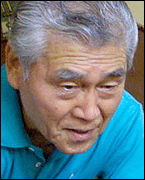

![]()
Gathering Places


![]()
Gathering Places
Death with dignity
is really about
freedom of choiceI was disappointed to read that Senate Health Committee Chairman David Matsuura chose to bottle up the bill on doctor-assisted death that the House adopted and sent over to the Senate.
The bottom-line issue on doctor-assisted death is individual freedom of choice -- freedom to choose for oneself whether to extend life or, if the quality of life is irreversibly deteriorated, to die with the help of a doctor.
Recent advancements in medical research and application have made it possible for many of us to live longer and healthier lives. But none of us can live forever. Unless we die by accident or from sudden organ failure, we are likely to reach a state of debilitating physical and/or mental deterioration that requires constant end-of-life care by family, friends and professional caregivers.
A visit to elder-care hospitals and nursing homes reveal many patients lying helplessly in fetal positions, staring blankly day in and day out. Some may continue to yell and scream at no one in particular; and some are unable to recognize even relatives and friends who come to visit them.
The House-proposed death-with-dignity legislation would continue to permit anyone who so chooses to remain in a fetal position, to yell one's head off, or to languish in a stupor all day. Anyone who wishes to fight death to the very end could continue the struggle. Anyone who feels beholden to God for one's birth -- and believes that only God should determine the time, place and method of one's death -- would have the freedom to make such a choice.
The death-with-dignity law is for persons like me who want to have the option to choose the manner in which we meet death. When the time comes that I am clinging to the end of my life-rope, I want the freedom to continue to hang on or let go with the help of my doctor.
As with the people of Oregon, surveys show that a majority of the people of Hawaii favor a law that allows such a choice. It is outrageous for a minority of citizens to compel elected officials to employ the force of law to deny the choice for the majority on a matter involving our personal lives.
The minority who oppose doctor-assisted death strenuously argue that our society needs to protect itself from abuse of a law that gives individuals the power of choice. No law regulating human behavior is, of course, entirely free of abuse. But arguments that the proposed law would lead to treating the handicapped as "rubbish" and that the law would plunge Hawaii down a "slippery slope" to another "holocaust" are scare tactics of the minority.
The proposed law provides for judgmental and procedural limits and controls on the parties who would be involved in administering the death-with-dignity law. The bill, as the House amended it, would allow people to obtain medication to end their lives only if they were suffering from a disease and expected to die within six months.
I am grateful and take pride, especially since World War II, that our territorial and state Legislatures have enacted laws expanding the equality of opportunity and freedom of choice for our citizens.
The House bill on doctor-assisted death extends the good work of our previous Legislatures by permitting freedom of choice to individuals at the end of their lives.
Many of my contemporaries and I have personal stakes in calling attention of the urgency of the proposed legislation. We who are veterans of World War II are of an age and physical condition that soon may require our making critical decisions on the matter. We would not want our doctors to prolong our suffering because of their fear of being sued or deprived of their license under the restrictive provisions of our present law.
Hideto Kono, former head of what is now the state Department of Business, Economic Development and Tourism, was chairman of the governor's Blue Ribbon Panel on Living with Dignity.